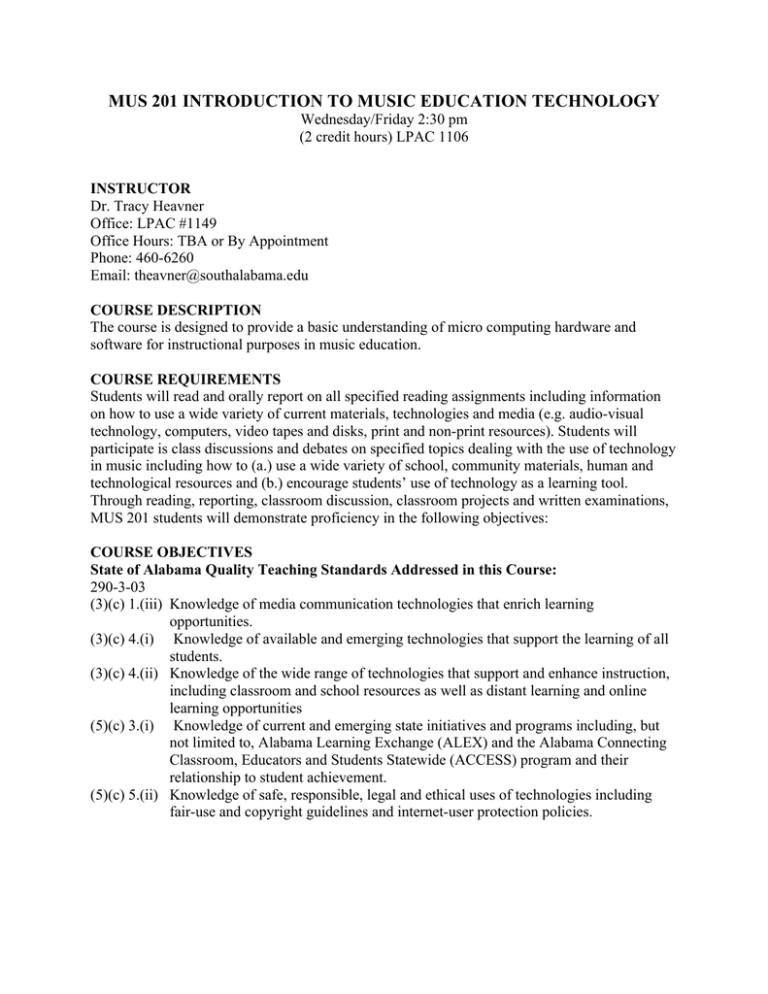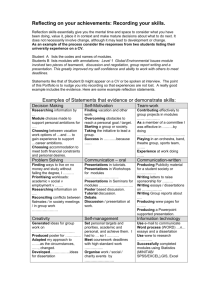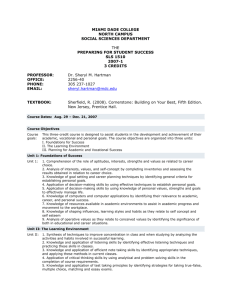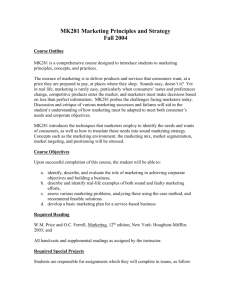MUS 201 INTRODUCTION TO MUSIC EDUCATION TECHNOLOGY
advertisement

MUS 201 INTRODUCTION TO MUSIC EDUCATION TECHNOLOGY Wednesday/Friday 2:30 pm (2 credit hours) LPAC 1106 INSTRUCTOR Dr. Tracy Heavner Office: LPAC #1149 Office Hours: TBA or By Appointment Phone: 460-6260 Email: theavner@southalabama.edu COURSE DESCRIPTION The course is designed to provide a basic understanding of micro computing hardware and software for instructional purposes in music education. COURSE REQUIREMENTS Students will read and orally report on all specified reading assignments including information on how to use a wide variety of current materials, technologies and media (e.g. audio-visual technology, computers, video tapes and disks, print and non-print resources). Students will participate is class discussions and debates on specified topics dealing with the use of technology in music including how to (a.) use a wide variety of school, community materials, human and technological resources and (b.) encourage students’ use of technology as a learning tool. Through reading, reporting, classroom discussion, classroom projects and written examinations, MUS 201 students will demonstrate proficiency in the following objectives: COURSE OBJECTIVES State of Alabama Quality Teaching Standards Addressed in this Course: 290-3-03 (3)(c) 1.(iii) Knowledge of media communication technologies that enrich learning opportunities. (3)(c) 4.(i) Knowledge of available and emerging technologies that support the learning of all students. (3)(c) 4.(ii) Knowledge of the wide range of technologies that support and enhance instruction, including classroom and school resources as well as distant learning and online learning opportunities (5)(c) 3.(i) Knowledge of current and emerging state initiatives and programs including, but not limited to, Alabama Learning Exchange (ALEX) and the Alabama Connecting Classroom, Educators and Students Statewide (ACCESS) program and their relationship to student achievement. (5)(c) 5.(ii) Knowledge of safe, responsible, legal and ethical uses of technologies including fair-use and copyright guidelines and internet-user protection policies. MATERIALS Rudolph, Thomas (2008). Experiencing Music Technology, Updated 3rd Edition, GIA Pub. 1 Flash drive EVALUATION Projects/Assignments Tests Attendance//Discussion 40% 40% 20% GRADING POLICY 1. All assignments must be turned at the beginning of class on the due date. Late assignments will not be accepted. Students may turn in assignments early if a class is going to be missed. (Late assignments due to documented illnesses or family emergencies will be decided upon on an individual basis.) 2. Tests and exams cannot be made up unless you have a valid, documented excuse. 3. The final grade for the course will be determined using the following scale: A=100-90%, B=89-80%, C=79-70%, D= 69-60%, F= 59% and below. ATTENDANCE POLICY Students are graded on attendance and are allowed 3 absences with no penalties. After the third absence, each absence will result in a student’s attendance grade being lowered by 3 points. Attendance is worth 20% of a student’s final grade. STATEMENT REGARDING STUDENTS WITH DISABILITIES In accordance with the Americans with Disabilities Act, students with bona fide disabilities will be afforded reasonable accommodation. The Office of Special Student Services will certify a disability and advise faculty members of reasonable accommodations. If you have a specific disability that qualifies you for academic accommodations, please notify me and provide certification from Disability Services (Office of Special Students Services). The Office of Special Students Services is directed by Ms. Bernita Pulmas and is located at 5828 Old Shell Road. The telephone number is 460-7212. STATEMENT REGARDING CHANGES IN COURSE REQUIREMENTS Since all classes do not progress at the same rate, the instructor may wish to modify the requirements or their timing as circumstances dictate. If any modifications are required, students will be given adequate notification in writing. JagSuccess JagSuccess is a program intended to help students be successful in 100-200 level courses. If you are not doing well, you will receive an email instructing you to see your professor, along with instructions to access an online tutorial intended to help with common problems affecting academic performance. Watch for this email during week eight of this semester. TENATIVE CLASS SCHEDULE Week 1 Aug 20 Aug 22 Course Introduction, Syllabus, Course Requirements Discuss Modules 1-5, (pp 1- 45) Discuss Assignment #1 Week 2 Aug 27 Discuss Modules 1-5, (pp 1- 45) Assignment #1 Presentations Discuss Modules 6-7, (pp 46-80) Assignment #1 Presentations Aug 29 Week 3 Sept 3 Sept 5 Week 4 Sept 10 Sept 12 Week 5 Sept 17 Sept 19 Discuss Modules 6-7, (pp 46-80) Discuss Assignment #2 Discuss Modules 8-9, (pp 81-126) Discuss Modules 8-9, (pp 81-126) Assignment #2 Presentations Class Cancelled (Presidential Inauguration) Discuss Modules 8-9, (pp 81-126) Assignment #2 Presentations Review for Exam #1 Discuss Assignment #3 Week 6 Sept 24 Sept 26 Exam #1 Discuss Modules 10-11, (pp 126-141) Assignment #3 Presentations Week 7 Oct 1 Discuss Modules 12, 14, (pp 167-196, 213-228) Assignment #3 Presentations Discuss Modules 12, 14, (pp 167-196, 213-228) Assignment #3 Presentations Discuss Assignment #4 Oct 3 Week 8 Oct 8 Oct 10 Discuss Modules 15-16, (pp. 229-268) Discuss Modules 15-16, (pp. 229-268) Assignment #4 Presentations Week 9 Oct 15 Review for Exam #2 Assignment #4 Presentations Exam #2 Oct 17 Week 10 Oct 22 Discuss Modules 17, 19, (pp 269-310, 331-356) Discuss Assignment #5 Oct 24 Discuss Modules 20-21, (pp 357-402) Week 11 Oct 29 Oct 31 Assignment #5 Presentations Assignment #5 Presentations Week 12 Nov 5 Assignment #5 Presentations Discuss Assignment #6 Discuss Modules 20-21, (pp 357-402) Nov 7 Week 13 Nov 12 Nov 14 Assignment #6 Presentations Assignment #6 Presentations Week 14 Nov 19 Nov 21 Discuss Modules 22-23, (pp 403-444) Discuss Modules 22-23, (pp 403-444) Review for Exam #3 Week 15 Nov 26 Nov 28 No Class (Thanksgiving Break) No Class (Thanksgiving Break) Week 16 Dec 3 Exam 3




